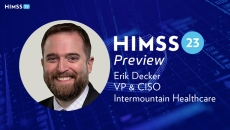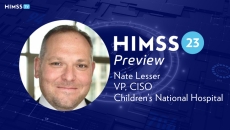Privacy & Security
HIMSS23
Intermountain Healthcare VP and CISO Erik Decker says interconnectivity inside and outside a hospital means health systems must evolve from one-time transaction risk assessments.
These attacks are flooding targeted networks and servers and threatening to shut sites down, rendering them inaccessible to clients.
With quantum computing now a reality, and poised to turbocharge machine learning and precision medicine across healthcare, one expert who's speaking at HIMSS23 says it's time to prepare.
By being aware of certain tactics and red flags, IT and security teams can take proactive steps to detect misuse of former employees' access credentials before they cause harm, says Imprivata's Joel Burleson-Davis.
By taking legal action, the companies will effectively sever connections to "cracked" copies of Cobalt Strike used in more than 68 ransomware attacks on healthcare organizations.
Real-world data is key to driving effective response to emerging health threats, says Dr. Monique Mansoura, executive director of global health security and biotechnology at MITRE, who will lead a discussion on the topic at HIMSS23.
Abbott's Curt Blythe, Medtronic's Matt Russo and MITRE's Matt Weir discuss security across the product life cycle, how to get support from device company leadership – and how you can become a device tester.
With "force multipliers" enterprises can improve healthcare cybersecurity and reduce costs, says Nate Lesser, vice president and CISO at Children's National Hospital, in a preview of his HIMSS23 presentation.
Providers, hospitals and medical device manufacturers can use the company's Cyber Supply Chain Risk Management application to minimize software-based security risks.
Robert Booker, chief strategy officer at the Health Information Trust Alliance and a 30-year cybersecurity veteran, offers his thoughts on what every healthcare provider organization needs to know about information security strategy.








